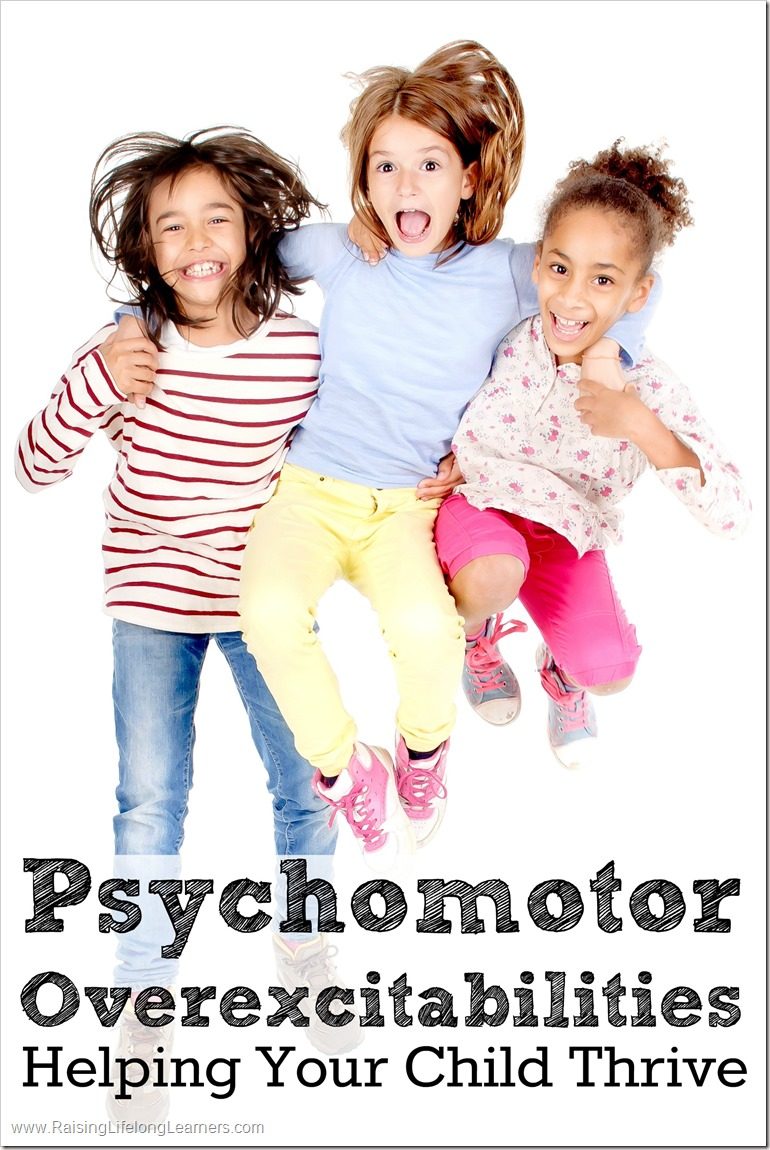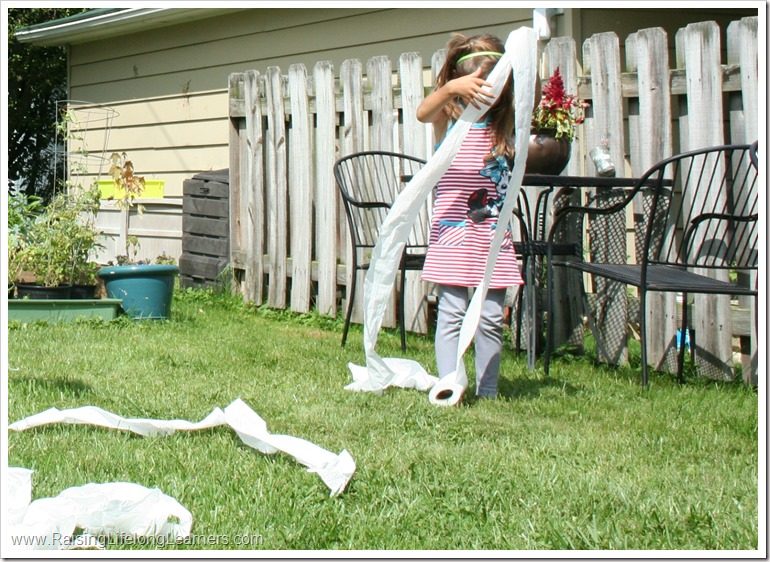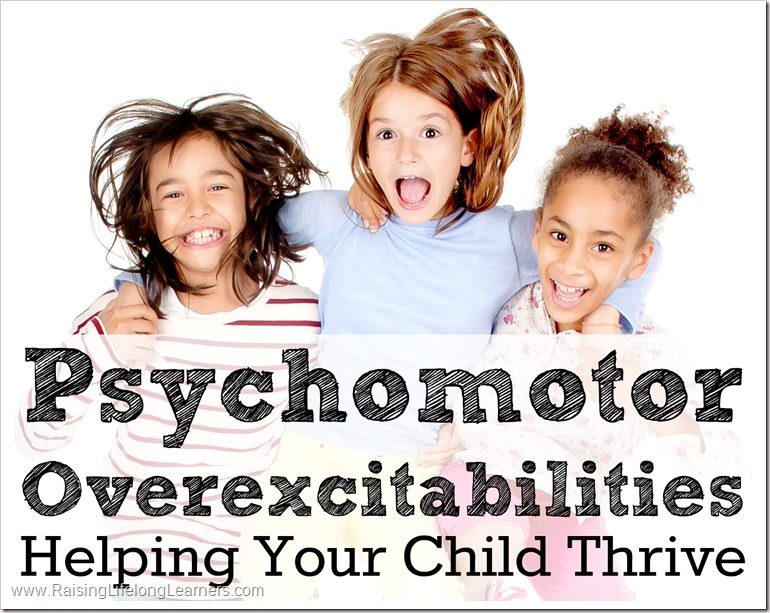Psychomotor Overexcitabilities: Helping Your Child Thrive
It was years ago, but it’s a day that is firmly etched in my mind. The Monday before Thanksgiving break, my then first-grader got off the bus with his head hanging. “Mom,” he said with tears brimming and threatening to fall, “if I can’t get all green on a two-day week, then I’ll never earn Tiger Cash.” And he walked sadly into the house for his after-school snack.
Tiger Cash was the reward his teacher gave children who “stayed on green” {their behavior barometer} all week long. For my overexcitable son, it was an impossible task as his teacher didn’t allow them to regain “green” if they fell to “yellow” or “red” during the day.
Here’s where I’d love to be able to tell you I remembered all that I’d been taught in my coursework on gifted children, and from looking into similar eyes brimming with tears on the students I once advocated for.
But I didn’t.
That day prompted several months of interventions, medication trials, and diagnoses that didn’t feel right {ADHD, OCD, Oppositional Defiance, etc.} until several months later I finally listened to my gut – and my background – and my husband and I pulled Trevor out of school and started our homeschooling journey.
Just to be clear – I’m not discounting the reality of kids who have ADHD. I believe that it is real, and that kids who have been thoroughly tested with observations in numerous settings {and not just through a subjective checklist of traits} should be treated appropriately.
There is a difference, though, between a child with ADHD and a child with psychomotor overexcitabilities:
An ADHD child moves constantly. He fidgets. He seems directionless and has no real purpose for his movement. He just compulsively needs to move, without a real awareness that he is doing it.
An intense gifted child with psychomotor overexcitabilties moves constantly, too. He just does it with more purpose. To show you what he’s thinking, to organize the books that look “off” on the bookshelf, to build a new Lego layout for the pending battle that is raging in his head, to grab the soldering iron and a screwdriver so he can dismantle the old computer he picked up at co-op and join it together to make a new invention.
Gifted and Psychomotor Overexcitabilities
Gifted children like Trevor are disproportionally singled out for ADHD evaluation and diagnosis, according to researchers in a study published in the Roeper Review. {“Overexcitabilities and ADHD in the Gifted: An Examination,” by Anne Rinn and Marilyn Reynolds, Roeper Review, Volume 34, 2012, pp. 38-45}
Children with psychomotor overexcitabilities display extreme energy and activity levels.
Psychomotor overexcitabilities are caused by a heightened energy in the neuromuscular system, hence the prefix. Psycho- means it’s something related to the mind.
The minds of highly gifted, intense kiddos, who display psychomotor overexcitabilities just. won’t. stop. These kids love movement for the sake of moving. They have an overabundance of energy that is displayed through rapid {and ceaseless} speech, enthusiasm, the need for intense physical activity, and the craving for action. Sitting around just won’t work for these kids.
When stressed, children with psychomotor overexcitabilities may talk over anyone and everyone, act impulsively, misbehave in ways that are seemingly incongruent with their age, display nervous habits like tics, and may even act compulsively – organizing things or arguing about perceived inconsistencies.
They are overwhelming to other people…even to their parents.
Overexcitabilities are Not Bad… They Just Are
Can you relate? Do these characteristics describe your gifted or intense child? It can be an overwhelming and isolating thing to parent children like this. Others don’t quite understand exactly what you’re going through. In fact, to the outside world, kids like this seem off. They seem socially inept, like they’re disobedient for the sake of being so, and like they don’t care at all for what others think.
Here’s the thing, though… Children with psychomotor overexcitabilities have the potential to be world-changers. Overexcitabilities are a part of who they are. Their minds are working at a rapid pace, and they need us to help them harness that mental energy appropriately.
Overexcitabilities are not traits that should be treated or fixed, they are gifts that should be embraced and directed.
I had a friend in high school who recognized the overexcitabilities in herself. She knew she was best in everything she did early in the morning and throughout the day. She was tired, impulsive, and out of sorts in the early evening. So she decided that between the hours of 7:00 p.m. and 3:00 a.m she’d sleep. And she did. She awoke at three every morning, worked on schoolwork, projects, or hobbies, ate breakfast, and was ready for a full day of school by the 7:30 a.m. start time. She graduated valedictorian and is a successful physician with gorgeous children today.
She made her overexcitabilities work for her – in the way she worked best.
Helping Our Children with Psychomotor Overexcitabilities Cope and Thrive
What can you do to help your child live with his or her psychomotor overexcitabilities? Better, how can you help your intense child thrive? What are some strategies that will work?
I have to admit that the flexibility homeschool offers is perfect for kids like this – those wiggly kids who just won’t sit still. Those kids who just won’t stop talking. Those kids who are just… more. You can help them thrive in numerous ways, by trying different strategies, and seeing what works best for YOUR intense child:
Keep Them Moving
Give children with psychomotor overexcitabilities plenty of time during the day for physical and verbal activity.
- Build activity and movement into their day.
- Have them stand to do their work.
- Put different subjects in different rooms so they have to travel between assignments.
- Include lots of opportunity for verbal answers of questions, rather than requiring them to write everything down.
- Make sure that there are plenty of hands-on learning opportunities available.
Be spontaneous often.
- Create opportunities for open-ended play and projects.
- Let them listen to music through headphones, fidget with small toys, or chew gum.
- Take lots of exercise breaks – go for walks, jump on the trampoline, ride bikes, do jumping jacks, etc.
- Take field trips often.
- Change things up when your child least expects it.
Help Them Find Purpose
- Introduce them to different hobbies to help them find interests and passions.
- Talk to your kids about what they love, and tell them about your interests and passions. Let them see you enjoying hobbies and work.
- Ask questions… and really listen to the answers. {I notice that you have checked quite a few books out of the library about rocks and minerals. Have you ever thought about collecting rocks? Is there anything I can help you find out?}
- Make time to visit re-enactments, museums, lectures, and as many enriching experiences as possible so that your kids are exposed to different time periods, jobs, and topics as possible.
- Encourage your children to explore possibilities and to think about potentials.
- Provide puzzles, games, and plenty of time to foster creativity.
Most Importantly…
If you only take one thing from this post, remember that your child’s psychomotor overexcitabilities are part of who she is. They’re special because she’s special. They were given to her for a purpose – to help propel that fantastically sharp mind reach all kinds of impossibilities.
And you are the perfect parent to help her reach that potential. Parenting wasn’t meant to be easy; it’s meant to be a journey that makes you stronger. Love that special kiddo, and give her all the opportunities to move, think, wiggle, talk, and be amazing.
Help her harness that energy. She’ll change the world along with others like her.
What are some of your best tips for harnessing that brain power in a positive way? Share in the comments if you can – I’m sure there are other parents out there {including me} who could use more tips.
For more information on parenting gifted kids, check out:





